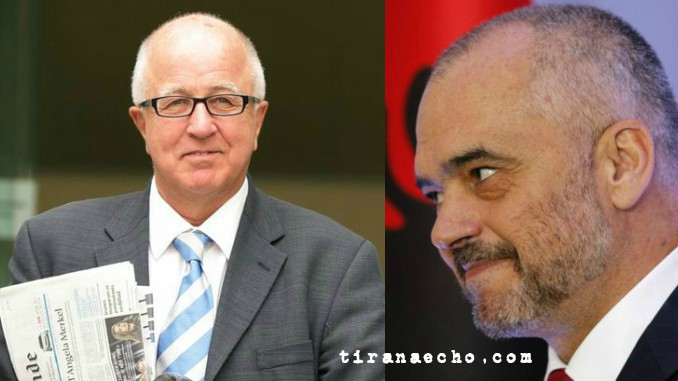
All eyes are on elections in Britain, France and soon Germany but quite the most bizarre election seen in Europe since the end of communism is due to take ten days after the British poll next month, writes Denis MacShane.
Denis MacShane was UK minister for the Balkans 2001-2005. He visits and writes on the region.
In Albania, where politics has been rough-and-ready since the communist era ended – but at least different parties have held power and elections have been respected – the main opposition party has come up with a novel way of challenging the ruling Socialist party in power since 21013.
In a tactic that might appeal to Jeremy Corbyn or to Marine Le Pen last weekend the main opposition Democratic Party has said it will boycott the elections due on 18th June.
Current Prime Minister Edi Rama is a very moderate European centre-leftist more in the style of a Tony Blair or even Emmanuel Macron. He has faithfully supported US and EU policy sending Albanian troops to fight IS in Iraq and legislating a tough code of judicial reform – vetting old-style judges who never seemed to want to take action against business cronies of national and regional politicians whose palms were crossed for government contracts, planning permissions.
Washington, Brussels and Berlin have all demanded judicial reform in Albania to root out corruption and clientelism as an essential step if the 3-million strong country is going to even begin being considered as a possible EU member state.
But the Democratic Party has made opposition to vetting judges the main plank of its programme to regain power.
Federica Mogherini was recently in Tirana and told Albanian MPs: “Those who do not vote for the vetting, do not want Albania’s EU integration”.
The day after Mogherini’s visit, the Democratic Party leader Lulzim Basha denounced her as he whipped up anti-EU emotions during an opposition protest rally stating: “There have been many EU officials who came here and said that there will not be EU integration without free and fair elections, fighting corruption, fighting drugs etc.
Now they say it’s all about vetting and as soon as vetting is implemented EU negotiations can start. We have a word in Albanian for this and it is ‘brockulla’ and in English it is ‘bullshit’.”
The crowd then began chanting “Bullshit! Bullshit! Bullshit”. Despite being educated in northern Europe and working for the United Nations Basha has reverted to mass street demonstrations and a tent city opposite the Prime Minister’s office as his preferred method of electioneering. No-one knows where the money comes from for a very expensive campaign of protests and street city centre occupations.
Basha calls his supporters “freedom-fighters” and with plenty of weapons in private hands after military and police armouries were opened and looted when Albania collapsed into chaos during the giant pyramid-selling scandal of the late 1990s, there are more-than-reasonable worries that Western Balkans violence can erupt again. Instead of talking to voters Basha is mobilising a giant rally at the weekend in order to increase tension and create a crisis in which normal democratic processes are suspended.
Prime Minister Rama has offered Basha ministerial posts in a giant coalition and defused as many flashpoints as he can but he cannot withdraw his promise to the US and Europe to continue with judicial reform nor can he dodge the election date.
So noone knows how to deal with Basha’s refusal to participate in the election. His Democratic Party is affiliated with the dominant EU political federation, the European People’s Party, who have told him that in a democracy elections are held and parties have to participate in them. There are seven members of the US Congress in Albania this week also scratching their head at this novel Albanian gambit of refusing to take part in an election.
The European Commission has said that the elections on 18 June will be legitimate and accepted by Europe even if the Democratic Party keep up its policy of destabilising tension by boycotting the poll.
Mrs Merkel’s European People’s Party could get tough and expel Basha. But as with the EPP’s man in Hungary, Viktor Orbán, Berlin doesn’t know how to handle one of its sister parties who breaks the rule of European democracy.
his extraordinary turn in the history of European elections is understandably getting very little notice given the electoral excitements north of the Alps.
But as in Serbia, Macedonia, Kosovo, Bosnia and Montenegro, Western Balkan politics with its corrosive current cocktail of nationalist populisms, Russian meddling, and refusal to move to mutual cooperation and recognition remains a tinder-box that could once again erupt into flames.
Source: Euractiv.com